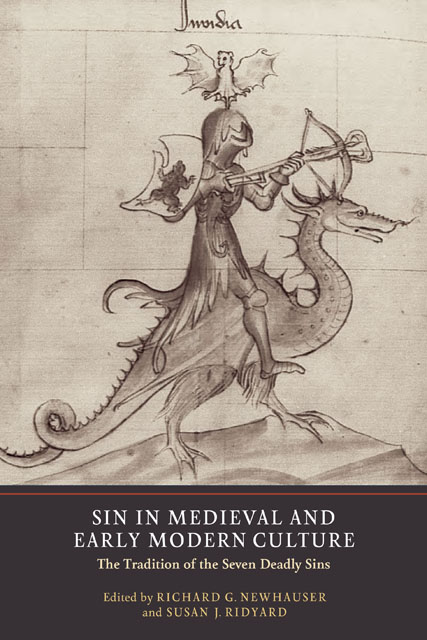7 - ‘These Seaven Devils’: The Capital Vices on the Way to Modernity
Published online by Cambridge University Press: 28 February 2023
Summary
Histories of the seven deadly sins often depend on the view of Morton Bloomfield (confirmed by John Bossy) in assuming an end to ‘the tradition’ of the heptad of vices at the transition from the Middle Ages to the early modern period. This essay argues, on the other hand, that a relative theological and sacramental disinterest in the heptad within Catholicism was in fact a historical precondition for the expansion of other functions the vices had served. The use of the vices in England from the fifteenth through the seventeenth century is examined here as a case study of the employment of the seven sins in three broad areas: religious polemics, not only in the conflict between Catholics and Protestants, but among Protestant denominations; dramatic representations of the vices in various settings, from morality plays and interludes to Marlowe’s Faustus; and the critique of the power of the royal court, notably in Spenser’s Faerie Queene.
Sin and periodization
The appearance of the seven deadly sins in Edmund Spenser’s The Faerie Queene has attracted a series of scholarly commentators. In particular, the manifestations of the sins in Book II, the sources of the procession of the vices at the House of Pride in Book I, and the order of the sins and their internal coherence in this episode have all inspired important studies. This scholarly attention has deepened our understanding of the parade of the vices in the narrative of the Redcross Knight in Book I, and of the value of temperance in understanding the vices in Book II. Yet, as important as these scholarly articles have been,they collectively beg a larger question, one that will guide me in this essay. The first book of Spenser’s text, in particular, is not only an allegory of the soul’s salvation intended for Protestant gentlemen; it is also a rejection of any previous promises of Christian salvation. In its anti-Catholic articulation of a specifically Protestant spirituality there is barely a stereotypical figure of the Catholic clergy that is not mocked mercilessly or a central point of Catholic theological doctrine that is not rebuffed sharply.
- Type
- Chapter
- Information
- Sin in Medieval and Early Modern CultureThe Tradition of the Seven Deadly Sins, pp. 157 - 188Publisher: Boydell & BrewerPrint publication year: 2012



